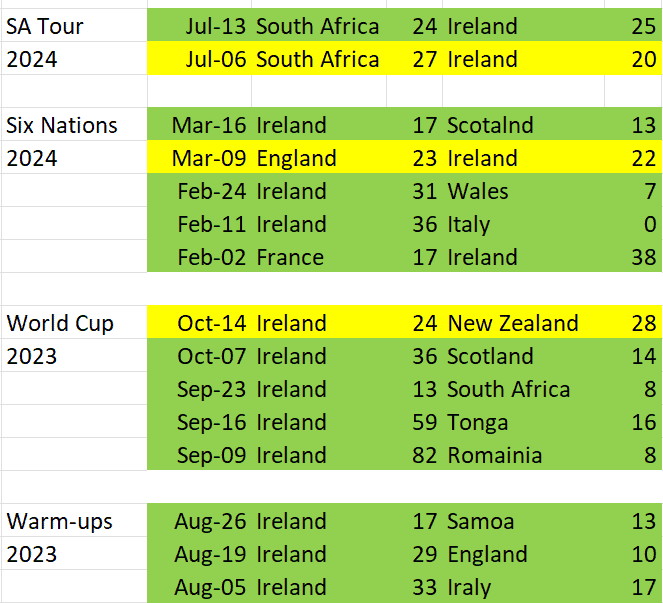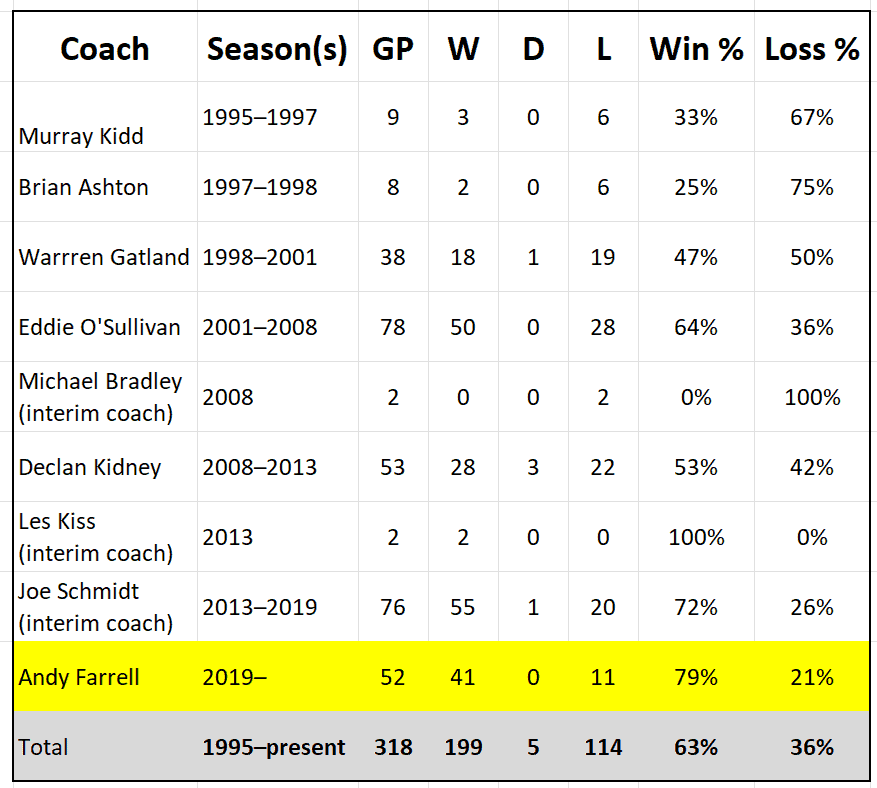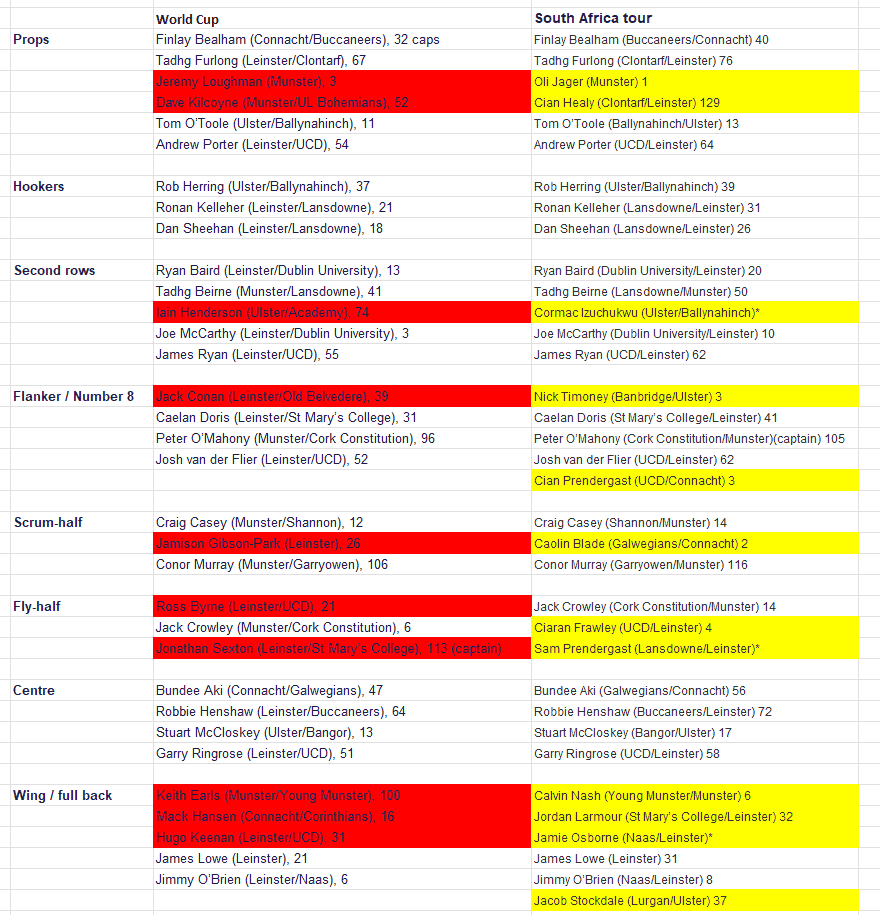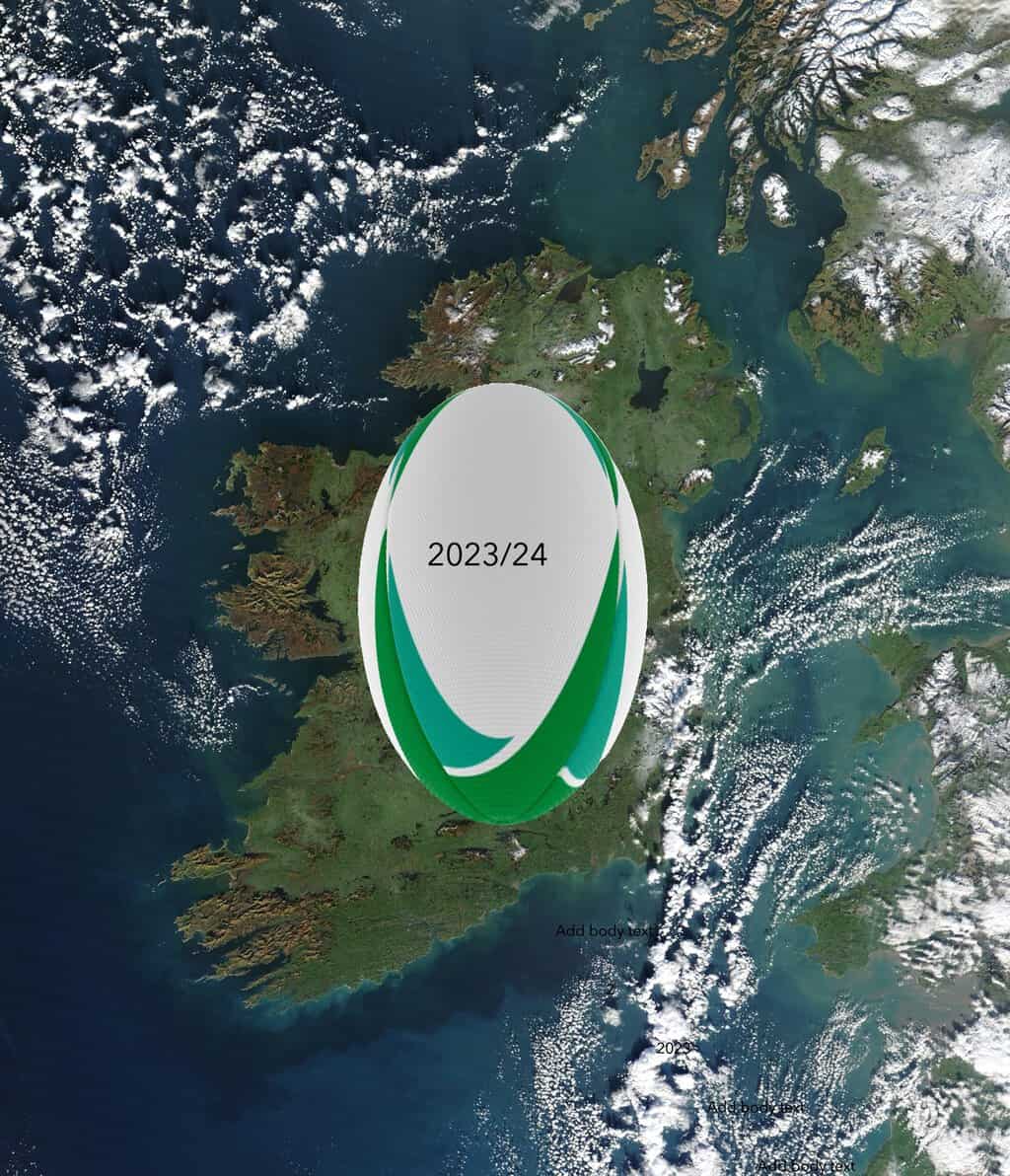As the end of a thirteen month 15 man rugby season has arrived, it seems like a good time to review the season as a whole. Although many will point to our failure to get beyond our World Cup quarterfinal glass ceiling and the failure of the Irish provinces to win anything as pointing to a poor season overall, I am a firm believer that the glass is at least half full!
First of all, we were the only team to beat the eventual champions, South Africa, at the world cup, and have just done so again, away in Durban. Secondly, we won the Six Nation’s championship, despite losing to a last minute score by England in Twickenham. Thirdly, losing to an outstanding New Zealand side in the World Cup by one score is no disgrace.
No team wins every match they play, and Ireland has compiled the third longest winning streaks in Tier 1 rugby history: 17 matches from July 2022 to October 2023, beaten only by 18 match winning streaks by New Zealand and England, both ended by Ireland in 2016 and 2017, respectively. Ireland haven’t been outside the top three in the world rugby rankings since July 2022 and were ranked no. 1 for the fifteen months until that New Zealand world cup defeat.
Ireland played 15 tests this season (more matches than many club professionals play) and won 12 of them, by an average winning margin of 22.4 points, losing three by an average of 4 points.

Andy Farrell’s record as coach is now better than any of his permanent predecessors in the professional era with a 79% win ratio, ahead of Joe Schmidt (72%), Eddie O’Sullivan (64%) and Declan Kidney (53%), the only other coaches to achieve a 50% or better win ratio.

However, it has not been a case of standing still: The Irish squad has evolved over the past year. The table below compares the 2023 rugby world cup squad with that for the 2024 South Africa tour.

Jonathan Sexton and Keith Earls have retired. Dave Kilcoyne, Ian Henderson, Jamison Gibson-Park, Mack Hansen, Hugo Keenan, and Jack Conan were unavailable for the SA tour. Ross Byrne and Jeremy Loughman were dropped. Cian Healy, Oli Jager, Cormac Izuchukwu, Nick Timoney, Cian Prendergast, Caolin Blade, Ciaran Frawley, Sam Prendergast, Calvin Nash, Jordan Larmour, Jamie Osborne, and Jacob Stockdale have come into the squad. Only Jager and Izuchukwu had never been involved in an Ireland squad prior to the World Cup and Jager was capped in the 2024 six Nations against Wales.
The average number of caps per squad member has only gone down from 40 to 35 even after the departure of centurions Sexton and Earls and the unavailable/injured/dropped experienced players above, thanks to the number of caps which have been awarded in the meantime. The 46 additional caps awarded during the SA tour have brought that average back up to 37.
Ireland like to maintain an experienced core in their sides. Fans calling for wholesale changes tend to be disappointed but tend to underestimate the cumulative effect of many small changes over a 12 month period. 12 new players in a 35 man squad is a 34% turnover in one year, or the equivalent of a new team every three years. That is not stagnation.
Farrell’s methodology is clear: Identify emerging Irish talent and get them involved in an Ireland squad to learn the ropes even if there is no immediate plan to select them, barring an injury crisis. By the time their chance comes, they are well known to the coaches and well versed in Ireland’s systems. They are given every chance to succeed by surrounding them with experienced players.
Ireland do not make wholesale changes and throw players into the deep end to see if they will sink or swim. Building confidence by winning as we go along is the name of the game. Wearing an Irish jersey is too deep an honour to be given out on a hit or miss basis. As a result, players rarely let Ireland down – witness Jamie Osborne’s outstanding first two caps against South Africa where he recovered so well from early mistakes.
Only Joey Carbery, Jeremy Loughman and Ross Byrne have been de-selected in the past year, all overtaken by better emerging players. Only loosehead remains a problem position with a lack of depth to cover for an ageing Cian Healy and an overworked Andrew Porter. The rumour is Tom O’Toole is being prepared for a switch to loosehead with Jager becoming third choice tight head.
A lot hangs on academy looseheads like Jack Boyle coming through. David Humphrey’s has apparently put a ban on the provinces recruiting more looseheads from abroad, so they are forced to develop their own. The depowering of the scrum in Irish schools’ rugby (for understandable safety reasons) means that we are simply not developing enough powerful scrummagers at home, a fact which was underlined by South Africa’s dominance of the Irish scrum.
Frawley’s performance in South Africa will hopefully put the back-up 10 debate to bed, although he needs more game time at Leinster, as does the emerging contender, Sam Prendergast. With both Ulster and Connacht having to recruit 10’s from abroad, IRFU Performance Director, David Humphries will be wondering if Ross and or Harry Byrne might not be better employed at another province.
But the key issue in all of this is continuity and consistency in selection. Players not selected are given feedback on where they have to improve. Succession planning is also vital. Nick Timoney and Cian Prendergast were included in the SA squad with a view to having more potential successors for Peter O’Mahony lined up (as well as the more established Tadhg Beirne, Jack Conan, and Ryan Baird). Sam Prendergast is being fast tracked as potential third choice ahead of the Byrne brothers. None of those three got actual game time this time around.
Improving our strength in depth in all positions is the name of the game. Another Emerging Ireland tour of South Africa has been arranged for October and I would expect players like Cormac Izuchukwu, Nathan Doak, David McCann, Scott Wilson, Harry Sheridan, Aidan Morgan, Niall Murray, Mathew Devine, Cathal Forde, Hugh Gavin, Thomas Ahern, Edwin Edogbo, Brian Gleeson, Sam Prendergast, Jack Boyle, James Culhane, and more members of recent successful Ireland u.20 teams to make that squad.
The interesting thing is that Leinster are by no means monopolising emerging talent.
The upshot of all this planning and development is that an Ireland team shorn of Keenan, Conan, Gibson Park, Hansen, Aki, Sheehan, Henderson, Casey, and with Captain O’Mahony relegated to the bench could take on an unchanged and the most experienced South African team in history and beat them in their own back yard. We will not always be so lucky as to have world class contenders for almost every position in an Ireland squad, and we have a way to go in addressing our scrum problems, but the future looks bright almost everywhere else.
—oo0oo—
The provinces, u. 20’s, 7’s, and women’s game
The future may not look quite so bright at provincial level, but some perspective is also needed here. Leinster and Munster qualified for the knockout stages of the Champions Cup with Leinster making it to their third final in a row. No other club has achieved that feat.
Once again Leinster were unfortunate to lose – a Frawley missed drop goal and some dodgy refereeing on this occasion – against an absolutely outstanding Toulouse team who went on to hammer Bordeaux in the Top 14 final. Gibson Park may be a world class 9, but Dupont is quite possibly the best rugby player of all time.
Leinster, Munster, and Ulster made it to the quarter-finals of the United Rugby Championship with Leinster beating Ulster and Munster beating Ospreys to make the Semi-finals. They were beaten by outstanding performances by the Bulls (at altitude) and a Glasgow team full of internationals who showed their mettle in the final. No other country had three quarterfinalists and two semi-finalists.
An inconsistent Connacht team achieved mid table respectability in a league that has become a lot stronger since the advent of the South African teams and the concentration of Scottish and Italian international players in Glasgow and Benetton. That is not to say Connacht and Ulster did not have their problems, but Ulster have begun to address theirs with a new CEO and Head Coach, and Connacht are developing their stadium to improve their future revenue streams. Both could do with a little more ballast in their front five.
Ireland U.20’s have won Grand Slams in 2022 and 2023 and lost out in 2024 only because of a 32 all draw away to England in March 2024. They reached the final of the World Cup in 2023 and have just lost to England in the Semi-final of the world Cup in 2024, thanks, in the main, to a superior English scrum. That level of consistency with nearly all new players every year is a considerable achievement and shows the quality and consistency of the IRFU elite player development pathways.
Having been neglected for far too long, the Ireland women’s XVs team currently lie 10th. in the world rankings but at least the IRFU have started pouring more resources in their direction following a critical review and promise to invest an additional €1 million p.a. into the women’s game at the end of 2022.
It would be remiss of me not to mention the achievement of the women’s 7 ‘s team in reaching the Olympics for the first time this month, and the Men’s team qualifying for the second time by winning Gold in the European games. It will be interesting to see how Keenan re-adapts to his former game.
I won’t comment on the club game in Ireland as I don’t have the expertise to do so but would welcome any contributions in the comments. The consensus appears to be that this will be the next area requiring more resources from the IRFU as soon as these become available. With the Welsh and Australian Unions nearing bankruptcy, the IRFU are to be commended for husbanding their resources carefully.
The vast bulk of the IRFU’s revenue comes from the Men’s XVs international game which is why our success at that level is so important. If the senior men’s team were to start losing a lot, the whole financial edifice that is the IRFU could come tumbling down. Prize money, gate receipts, commercial sponsorship deals, and TV revenues would be at risk. That is why Farrell is so reluctant to give into fan’s demands that he “experiment” more by blooding untested and inexperienced players.
The future funding and welfare of Irish rugby depends on c. 35 international players and Farrell and his coaches doing their job well.
Frank Schnittger is the author of Sovereignty 2040, a future history of how Irish re-unification might work out. He has worked in business in Dublin and London and, on a voluntary basis, for charities in community development, education, restorative justice and addiction services.
Discover more from Slugger O'Toole
Subscribe to get the latest posts sent to your email.
